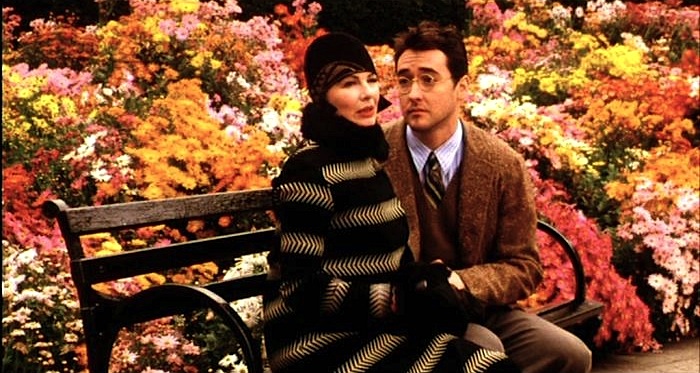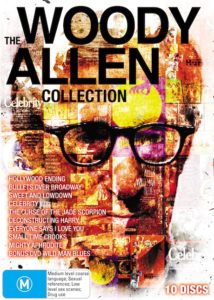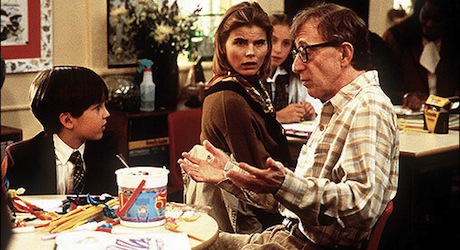Covering the films between 1994 and 2002, this may not be an essential collection but it is still filled with more quality per square inch than most collections this size.
[stextbox id=”grey” caption=”Disc Specifications” float=”true” align=”right” width=”220″]
Director: Woody Allen
Writer (s): Woody Allen
Runtime: 954 minutes
Starring: Woody Allen, John Cusack, Mira Sorvino, Sean Penn, Alan Alda, Drew Barrymore, Edward Norton, Kenneth Branagh, Judy Davis, Hugh Grant…and many more
Country: US
Video: 1.33:1, 1.78:1, 1.85:1 (16:9)/PAL
Audio: Dolby Digital Mono – English
Subtitles: English Captions
Extras: Documentary – Wild Man Blues
Distributor: Reel DVD
Rating: Highly Recommended
[/stextbox]
Woody Allen remains an unique enigma in the pantheon of auteur filmmakers, largely beloved by critics and hardcore fans but only recognised once every decade or so by the Oscars, BAFTAs or Golden Globes. This might be par for the course for a director that has released roughly one film a year since the mid-1960s. His most recent effort Midnight in Paris was a commercial and critical triumph, so Woody and his back-catalogue are in the limelight once again. Reel DVD’s collection is a curious trip through one of Allen’s most experimental phases, from Bullets Over Broadway (1994) through to Hollywood Ending (2002).
The earliest film in the set, Bullets Over Broadway is perhaps one of the sharpest. Having just released the slightly more serious Husbands and Wives (1992) and Crime and Punishment-esque Manhattan Murder Mystery (1993) – neither of which are on this set – Allen’s trademark humour returns via John Cusack. The entire cast and period setting suit the later-era Allen, and the madcap ritz of the film could serve as a spiritual cousin to last year’s Midnight in Paris. The other standouts are, of course, the Oscar winning (for the delightfully crash Mira Sorvino) Mighty Aphrodite (1995) and Deconstructing Harry (1997). The latter is filled with the quintessential neurotic New York types, not only playing off Allen’s own early self-reflective exercise Stardust Memories (1980), but also mirroring Ingmar Bergman’s Wild Strawberries (1957).
During this period, Allen increasingly began to use other actors as a stand-in for his trademark neurotic performances. Kenneth Branagh took over the Allen role in the idiosyncratic Celebrity (1998), although it is still Bullets Over Broadway that has the best non-Allen Allen performance. Sweet and Lowdown (1999), starring Sean Penn as a 1930s jazz musician, has Allen as a narrator and interviewed as himself. It’s a reminder that the bespectacled New Yorker has become as much a part of his own films as the rapid-fire, self-effacing dialogue. Even partial misses like The Curse of the Jade Scorpion (2001), or the less remembered Small Time Crooks (2000), suggest that Allen on-screen is still a formidable presence, despite the progressively youthful appearance of his female co-stars.
While this set represents the decade or so following Allen’s peak, it put him on the path to the run of films that, starting with Match Point (2005) would culminate in his his first Oscar in 25 years in 2011. Hollywood Ending (2002) was one of the first Allen films to not receive a theatrical screening in the UK, but while it lacks the pithy wit of Allen’s earlier work, it is still a self-aware dissection of the industry. That he was willing to experiment with a musical over thirty years into his film career with Everyone Says I Love You (1996), especially one that saw Edward Norton sing, is indicative that there has, and will never be, another like Woody Allen.
The Disc(s)
There are no bonus features on these discs, but Allen fans have grown used to this over the years. Technically Wild Man Blues (1997), Barbara Kopple’s documentary about Allen’s avocation with early 20th century New Orleans jazz, is listed as a bonus feature. It is effectively the tenth film in the set, and as the only film not directed by Allen, it serves as a documentary on the filmmaker – just not one about his films. Those looking for such coverage would do well to check out Robert B. Weide’s two-part American Masters piece, Woody Allen: A Documentary.
Don’t freak out because these all have mono audio – that’s how Allen intended it, and almost all of his releases have been presented this way. We also get an assortment of aspect ratios, from the fullframe 1.33:1 of Wild Man Blues to the 1.85:1 letterbox of Hollywood Ending.
Bottom Line
For Allen fans, this is a great way to complete the picture. For the uninitiated, start with the work of the 1970s and then work your way up to this overview.







